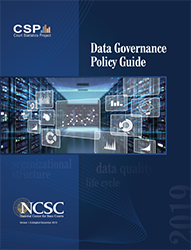Data Governance Self-Assessment Tool
As courts rely more heavily on data for case management, strategic planning, budgeting, and improving court performance, we recognize that data are more than by-products of case processing.
Courts and justice partners increasingly depend on ready access to data, and accurate and timely data are essential for public trust and confidence in the judiciary. Data are now strategic assets of the courts and courts need strong data governance policies and practices. This self-assessment will help you to identify areas of strength and provide suggestions for improvement in your data governance.
What is data governance?
Data governance is the framework by which courts reach and communicate organizational decisions around data, ensure that business activities and data management are synchronized, and develop and document long-and short-term strategies around the collection, use, and disposal of data. Data governance encompasses the people, court processes, and procedures that ensure that data are fit for managing cases, planning, and budgeting. Governance is about creating a culture around data creation and use, including how data rules are created and enforced and how disputes are resolved. Without strong data governance, courts risk wasting time and energy searching for missing information, collecting unnecessary information, correcting bad information, entering data redundantly, and making decisions repetitively and sometimes inconsistently.
Data Governance Policy Guide
Courts, the public and justice partners increasingly depend on ready access to accurate and timely data, which are necessary for public trust and confidence in the judiciary.
Data are now strategic assets of the courts and courts need strong data governance policies and practices to address the entire life cycle of data.
Download the Data Governance Policy Guide here.
Data Governance Special Topics
As America faces questions related to racial justice, so do courts. In addition to internal needs, courts often receive data requests seeking race and ethnicity data. This document is provided as a resource to courts.
As the use of data visualizations and dashboards becomes common within courts, it’s crucial to have a shared understanding of common terminology, design principles, and user experience standards. The Dashboard Design Guide serves as a reference to help court staff effectively utilize these tools and techniques.
Data Governance Resource List
- JTC Resource Bulletin: Responding to a Cyberattack
- JTC Resource Bulletin: GDPR for US Courts
- Data Breach Notification in the United States and Territories
- Data Breaches & Victim Service providers: Considerations for developing effective policies
- Frequently Asked Questions of the VAWA confidentiality provision

